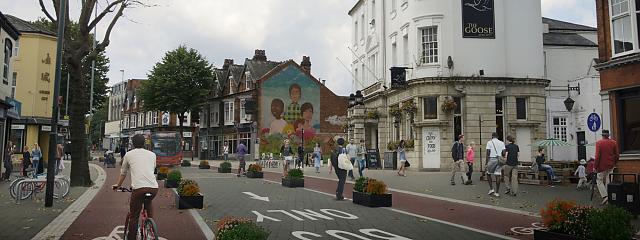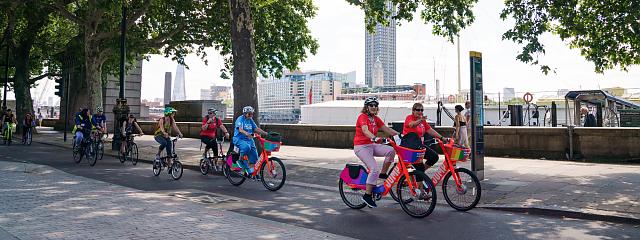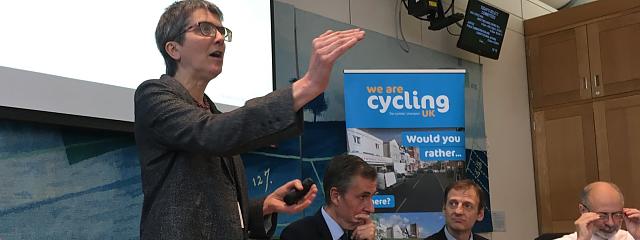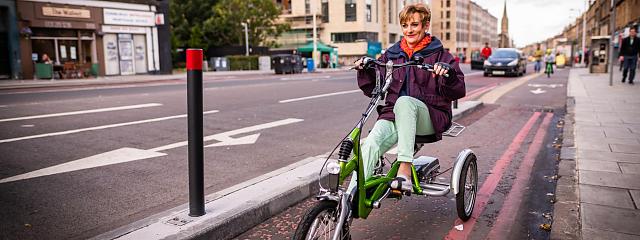
Show us the money for active travel
Show us the money for active travel
How will you double cycling without doubling investment?
That’s the question I asked in last week’s blog about Government's target to double levels of cycling in England by 2025 - a target it's admitted it won’t achieve through current levels of investment and intervention.
I focussed on doubling cycling because that’s a specific government target, set in its Cycling and Walking Investment Strategy (CWIS), and the former Transport Minister Jesse Norman MP admitted in May that meeting this would require “major further intervention”.
When asked about the adequacy of the current annual spend on cycling and walking, Jesse Norman also confirmed that the Government would need to “dramatically – potentially double or more that rate of intervention if we’re going to hit that (the targets)”, and it ought to be committing itself to doing so.
How the Government intended to double cycling without doubling investment was therefore the obvious next question, but the CWIS is about active travel, cycling and walking, and the front page of the strategy document sets out the mission: making cycling and walking the natural choices for shorter journeys, or as part of a longer journey.
So, the more important but less snappy question is: how on Earth do they plan to achieve this without radically increasing the active travel budget?
But why am I writing about this again this week? And what’s changed since we asked for your help last week?
The answer to the first question is that securing increased funding for active travel is a huge priority for Cycling UK, and in England the best opportunity to influence this, potentially for a number of years, is between now and November.
And what’s changed over the last week is that it’s become increasingly clear that the Government is ignoring the obvious, namely that the CWIS and targets for increasing and normalising active travel will remain aspirations rather than serious ambitions without a quantum leap in investment.
Doubled or tripled, however, it would still be a drop in the ocean as a percentage of overall transport spend.
Why is this time critical, and shouldn’t we just wait until Brexit is sorted before banging on about money for active travel? No, the time is now. We can’t wait.
Duncan Dollimore, Cycling UK Head of Campaigns
Well, the Government can ignore reality, but it can’t ignore the consequences of reality, and next week we’ll be ramping up our funding campaign with a simple message: you have targets, you’re not going to meet them, you’ve admitted you need to dramatically increase investment to do so, so why won’t you do it?
That’s why I am writing about this again this week, and why we’re going to be asking for your help to make our collective voice heard. But why is this time critical, and shouldn’t we just wait until Brexit is sorted before banging on about money for active travel?
No, the time is now. We can’t wait. We need your help now.
We can all speculate about leadership elections, cabinet reshuffles, no deal scenarios and potential general elections, but one thing is almost certain: whoever is Chancellor of the Exchequer at the end of next week is going to rapidly have to fire the starting gun on a Government spending review for the period from April 2020 onwards.
The money each Department is to be allocated will have to be announced in the next budget, probably in November. Those Departments are therefore likely to have a couple of months to submit their bids to the Treasury explaining what money they need and for what. We need to make sure that the Department for Transport (DfT) is demanding a radical increase in funding for active travel within that spending review and not just talking about road building.
When the draft CWIS was published for consultation, Cycling UK applauded its ambitions and objectives, but despaired at the woeful lack of investment. Too little funding has since hampered the DfT’s efforts to deliver on the strategy, although once their budget was set, it was always going to be hard to eke out additional funding streams from year to year.
We now have the opportunity to push for a fundamental change in the priority given to active travel spend, and we can’t wait to see what happens with Ministerial re-shuffles. Even if there is a change of guard at the DfT, any new Minister needs to see from his or her inbox, and hear from their officials, that they’re going to have to go into the spending review batting for active travel funding, and not get bounced out by the Treasury.
So what's new about what we are going to do, and how can you help?
I said that it had become increasingly clear over the last week that the Government is ignoring reality regarding the need for a quantum leap in active travel investment. That’s because we’ve spoken to, liaised with and encouraged a number of MPs to ask some very direct questions around funding this week, with Chris Grayling answering questions on Wednesday to the Transport Select Committee, and Jesse Norman’s replacement Michael Ellis MP answering transport questions on Thursday. Here’s a flavour of the responses:
- Asked by Ruth Cadbury MP about the balance of transport funding allocations and the inadequacy of funding for cycling and walking, Mr Grayling talked about past investment, which his own Department has conceded is insufficient to get anywhere near the CWIS targets, rather than the additional investment that’s needed.
- Pressed further about whether there was sufficient funding to achieve the modal shift sought, Mr Grayling accepted that “you can always spend more”, without indicating they would do so, suggesting that within the spending review he would be “lobbying for more investment across different modes of transport”.
- Asked by the Committee Chair Lilian Greenwood MP about the £26 billion the Government spends annually on transport, and whether spending £400 million on cycling and walking (1.5%) is enough, Mr Grayling talked about the difference in unit costs, and how the cost of building a cycle lane was low compared to building a road junction (some might say a valid argument for building more of the former). He added that more was being made available, for example through the Transforming Cities Fund, and they were enabling local decision makers to decide what to do. (Cycling UK’s calculation is that taking all funding streams into account, the amount spent on cycling and walking in England (outside London) is 2% of total transport spending).
- Asked bluntly by both Matt Western MP and John Woodcock MP what estimate he had made of the resources required to implement the CWIS, Mr Ellis confirmed what had been spent but not was needed. There was no direct answer to either Mr Western’s follow-up question about the DfT’s admission that the CWIS targets wouldn’t be met through current investment levels, or to Mr Woodcock’s about when the Government would publish the long-awaited, DfT-commissioned evidence that reached this conclusion.
- Pressed further by Matt Rodda MP on the need to cut transport emissions, the role that increasing active could play in achieving this, the failure to achieve the CWIS targets and the current level of spending on active travel, Mr Ellis outlined current spending but not what would now be done to try and achieve those targets, or how the Government hoped to achieve a different outcome by doing the same thing, when that wasn’t working.
These answers were depressing. We’ve tried to work with the DfT and Ministers to secure increased funding for active travel, and will continue to do so. But, given the unwillingness to answer direct questions about how the targets will be met without radically increased funding, Cycling UK will be writing to the Secretary of State next Monday to repeat those direct questions.
We’ll also be writing to all members and supporters next week asking you to help by mailing Mr Grayling directly so that he knows - or, if he’s replaced next week, that his replacement knows - that you want a major increase in funding for active travel, and he needs to fight for this with the Treasury in the spending review. We’ll be turning our attention towards the Treasury as we approach the autumn.
In the meantime, you can still make your views heard by writing to the new Transport Minister and your MP today, whether or not you’ve already done so.
Let’s be honest, securing a radical increase in active travel funding in the spending review won’t be easy. There will be lots of competing demands for more money.
But we’ve got to make the case, and we’ve got to make it loudly, so please lend us two minutes of your time, email your MP, and next week help us by emailing Mr Grayling to let him know you want proper funding for cycling and walking.












